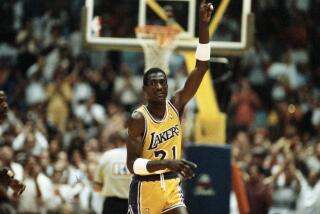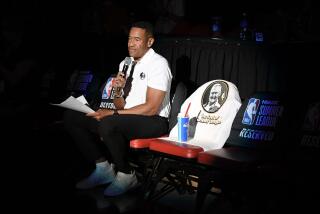COMMENTARY : O’Brien Made Difference for NBA
It was fitting that Larry O’Brien’s hometown was Springfield, Mass., site of the Basketball Hall of Fame and the place where basketball was invented.
O’Brien, who died of cancer at 73 Thursday night, was a key figure in reinventing the sport.
It may be hard for anyone who sees fans paying hundreds of dollars for courtside seats, owners paying millions of dollars for talent and television networks paying hundreds of millions of dollars for exclusive rights to believe the NBA was recently in trouble.
Believe it.
Less than a decade ago, this was a league on the brink.
Remember Magic Johnson’s memorable night of the title-clinching Laker victory over the Philadelphia 76ers in the 1980 NBA finals? Most of the country doesn’t because it wasn’t on live television. It was seen only in Los Angeles and Philadelphia. The rest of the nation had to stay up until 11:30 p.m. and watch it on a delayed basis if at all.
Such was the state of the NBA at the start of the 1980s.
Tape-delayed NBA playoff telecasts were common in those days when the league wasn’t considered ready for prime time.
Several seasons later, matters had become so financially bleak, there was serious discussion about merging several teams.
Expansion? Contraction was the buzzword in the NBA.
By 1983, dissatisfied players were threatening to strike. In its condition at the time, the league might not have survived.
Instead, with O’Brien as NBA commissioner, management and labor settled on the novel idea of giving players a percentage of league revenues tied to a salary cap.
The result has been prosperity for all sides and a booming era for the NBA that has seen the league take its place as a bona fide major sport along with football and baseball.
After becoming commissioner in the mid-1970s, O’Brien helped settle the so-called “Oscar Robertson suit,” which paved the way for free agency in the league. He ended the costly competition with the rival American Basketball Assn. by overseeing a merger.
Also under O’Brien, the NBA adopted the three-point shot, further increasing fan appeal.
The NBA’s championship trophy is named for O’Brien.
“The entire NBA owes Larry O’Brien a debt of gratitude,” said David Stern, who replaced O’Brien as commissioner in 1984.
NBA commissioner may have seemed a strange role for O’Brien, who spent the majority of his life working for the Democratic Party and directed the senatorial and Presidential campaigns of John F. Kennedy.
But O’Brien was a basketball fan long before he was a politician.
“I was a Boston Celtics fan, an ardent one,” he said in a 1981 interview.
“You had to be an ardent fan to travel a hundred miles from Springfield to the Boston Garden to see the Celtics and then come back in the early hours of the morning.”
In 1985-87, O’Brien served as president of the basketball Hall of Fame.
Joe O’Brien, executive director of the hall and no relation to Larry, called him “the right man at the right place at the right time for the Hall of Fame. . . . He served as president when we opened our new facility and he gave us a national credibility at a vital time in our growth.”
Remembering his days as a fan, O’Brien once said: “I was a nut. I’d get in the stands and I was probably as loud and vociferous as any fan you’d ever run into. I had plenty to say about the officiating and the coaching.”
And years later, as commissioner, he made himself heard, leaving a legacy of growth and prosperity that once seemed improbable.
More to Read
Go beyond the scoreboard
Get the latest on L.A.'s teams in the daily Sports Report newsletter.
You may occasionally receive promotional content from the Los Angeles Times.










